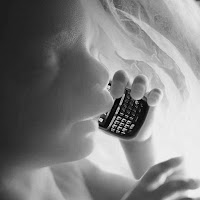This is what I know.
 |
Lightbulbs: Cheap.
Electricity: Expensive |
Ideas are a dime a dozen. Turning ideas into realities, practical realities; making them actually happen, is a whole other story. And then having another idea, to start all over again, to have the ability to do that over and over – coming up with great ideas and making them happen – over the span of a career is something else altogether.
So the issue for me is less about whether or not we are all creative and more about how do we sustain that creativity and remain productive over a lifetime commitment to our art. And even more challenging, how do we make it earn us a living?
Born to act
 |
The author (left)
clearly born to act - 1980 |
This notion that you are “born to be an artist”, or in theatre terminology, “born to act”, (that you can’t do anything else, that it is a God-given vocation) has its origins in history. As an actor for instance you would have been born into a family of players and learnt your craft by observing those around you. Or maybe you were sold into a circus or travelling troupe or even run away to do the same. Back then, there were no professional training institutions issuing tertiary degrees in the creative industries of performing arts.
Times have changed. Now every year, hundreds of graduates – full of great ideas and a student debt – leave the protective and creative environment of a training institution and start on the career path of looking for work or at least an outlet for their creativity.
So, you think you can act?
 |
| Cinderella listens to her iPod |
So what? Reality TV may have changed everyone’s idea of what it takes to be an artist by believing in the myth-making and money-making and the hype around “living your dream” – The Susan Boyle Story being just another version of
Cinderella – but the question is can these people – the winners of
Idol and
So You Think You Can Dance, have talent or X-factor etc. – sustain a life-long career? Only time will tell if they live happily ever after.
Sadly, in this digital age the camera does more than lie, it can visually and aurally enhance talent (or at least the appearance of it).
 |
| "Two tickets for this evening, please" |
Thankfully, the digital age has given rise to another breed of artist. In the US they call them the Ren Gen or Millennial Generation, in New Zealand and Australia they are called Computer or Digital Natives. And while we hate labels; it’s just a shortcut way of identifying the generation that has grown up with, and never known a world without, digital technology, computer games, mobile phones and i-pods.
This generation is smart, stylish, tertiary educated, well connected, socially networked, locally-based and internationally-focused. They want to make money; to make a difference; change or improve their lot or the entire world order. They are thinkers, doers, collaborators. And best of all they’re entrepreneurial.
Entrepreneurs have been around for a long time but the digital age has given them power, speed and visibility. They have learnt to subvert the well-trodden career paths and created their own direction, at times to great success (The Flight of the Conchords being a local example). They are turning great ideas into realities. They are the Independent Sector.
 |
Hipsters, entrepreneurs,
Downstage class of '03 |
And cities that cultivate (or have by osmosis) an “indie culture” – thrive! Think Seattle, Portland, Toronto, Glasgow, Manchester, Melbourne, Brisbane, Wellington. There has been a great deal written about this – especially cities that have reinvented themselves by capitalising on their creative communities.
And this is what I also know: all this “greativity” (great creativity) goes nowhere without recognition and support: infrastructure, mentoring, guidance, money, professional development, encouragement, opportunity.
Supportive Acts
Downstage designed the Presenting Partners programme to support the independent theatre sector, to reinvigorate the local theatre scene, to provide opportunities to showcase work, to guarantee paid employment and investment in independent artists and companies and to make projects happen – to ensure that great ideas see the light of day. We are just at the beginning of this way of working and we have BIG BOLD IMPOSSIBLE ideas.
We’ve been around for a long time – a life-time – 47 years and we plan to be around for a lot longer. Downstage is a repository of all that has gone before, a vibrant history that has led to our evolution. That knowledge and experience gives context and shape – a clear direction. By being a dynamic resourcing partner, we are not looking to back winners but to invest in people and their ideas, and to help them carve out sustainable careers that have a future.











